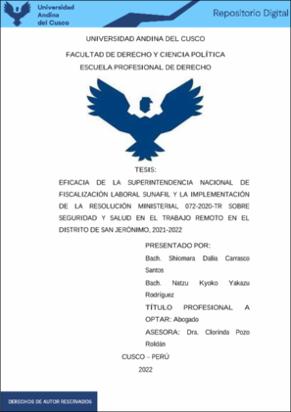| dc.contributor.advisor | Pozo Roldán, Clorinda | |
| dc.contributor.author | Carrasco Santos, Shiomara Dalia | |
| dc.contributor.author | Yakazu Rodríguez, Natzu Kyoko | |
| dc.date.accessioned | 2023-03-24T20:51:41Z | |
| dc.date.available | 2023-03-24T20:51:41Z | |
| dc.date.issued | 2022-12-12 | |
| dc.identifier.uri | https://hdl.handle.net/20.500.12557/5217 | |
| dc.description.abstract | La presente investigación tuvo como objetivo principal determinar si la SUNAFIL ha sido
eficaz al promover y verificar el cumplimiento de las obligaciones del empleador en la
Seguridad y salud en el trabajo remoto para el trabajador, implementado la Resolución
Ministerial N° 072-2020-TR. En cuanto a la metodología, corresponde el enfoque
cualitativo, la investigación fue de tipo socio jurídico, con un diseño descriptivo, la
Unidad de Estudio está conformada por profesionales entendidos en materia laboral y de
SST, empleadores que aplicaron el trabajo remoto, trabajadores que realizaron trabajo
remoto y la normativa vigente en SST. El escenario de estudio de la presente investigación
corresponde a la coyuntura de pandemia por el coronavirus (COVID-19), que generó que
el Estado tome medidas excepcionales para evitar su propagación, facultando la
aplicación del trabajo remoto, creando así obligaciones en SST para el empleador a favor
del trabajador. La técnica de investigación utilizada fue la entrevista semiestructurada. Se
concluye que la SUNAFIL no fue eficaz en la promoción y fiscalización de la Resolución
Ministerial N° 072-2020-TR, precarizando los derechos en seguridad y salud en el trabajo
remoto, pues no se pudo verificar que el empleador identifique, advierta y capacite al
trabajador sobre los riesgos que se generan en el trabajo remoto, y que estos riesgos sean
controlados conforme a ley. | es_PE |
| dc.description.abstract | The main objective of this research was to determine if SUNAFIL has been effective in
promoting and verifying compliance with the employer's obligations in the Health and
Safety at remote work for the worker. implemented Ministerial Resolution N° 072-2020-
TR. Regarding the methodology, it has a qualitative approach, the research was socio-
legal, with a descriptive design, the Study Unit is made up of professionals with
knowledge in labor law and occupational health and safety, employers who implemented
remote work, workers who did remote work and current regulations on safety and health
at work. the scene of study of the present investigation corresponds to the situation of the
coronavirus pandemic (COVID-19), that caused the State to take exceptional measures to
avoid massive contagion, empowering the application of remote work, thus creating
obligations in occupational safety and health for the employer in favor of the worker. The
research technique used was the semi-structured interview. It is concluded that SUNAFIL
was not effective in promoting and monitoring the Ministerial Resolution N° 072-2020-
TR, achieving the precariousness of health and safety rights in remote work, because it
could not be verified that the employer identifies, warns and trains the worker about the
risks that are generated in remote work, and that these risks are controlled according to
law. | en_US |
| dc.format | application/pdf | es_PE |
| dc.language.iso | spa | es_PE |
| dc.publisher | Universidad Andina del Cusco | es_PE |
| dc.rights | info:eu-repo/semantics/openAccess | es_PE |
| dc.rights.uri | https://creativecommons.org/licenses/by-nc-nd/4.0/ | es_PE |
| dc.subject | Trabajo remoto | es_PE |
| dc.subject | Seguridad y Salud en el Trabajo | es_PE |
| dc.subject | Fiscalización | es_PE |
| dc.title | Eficacia de la superintendencia nacional de fiscalización laboral Sunafil y la implementación de la Resolución Ministerial 072-2020-TR sobre seguridad y salud en el trabajo remoto en el distrito de San Jerónimo, 2021-2022 | es_PE |
| dc.type | info:eu-repo/semantics/bachelorThesis | es_PE |
| thesis.degree.name | Abogada | es_PE |
| thesis.degree.grantor | Universidad Andina del Cusco. Facultad de Derecho y Ciencia Política | es_PE |
| thesis.degree.discipline | Derecho | es_PE |
| dc.publisher.country | PE | es_PE |
| dc.subject.ocde | https://purl.org/pe-repo/ocde/ford#5.05.00 | es_PE |
| renati.advisor.dni | 23950891 | |
| renati.advisor.orcid | https://orcid.org/0000-0002-7808-7260 | es_PE |
| renati.author.dni | 47282544 | |
| renati.author.dni | 72203381 | |
| renati.discipline | 421016 | es_PE |
| renati.juror | Rivero Ynfantas, Fernando | |
| renati.juror | Quispe Ayala, Yesenia | |
| renati.juror | Calvo Rodriguez, Yuri | |
| renati.juror | Salas Callo, Antonio | |
| renati.level | https://purl.org/pe-repo/renati/level#tituloProfesional | es_PE |
| renati.type | https://purl.org/pe-repo/renati/type#tesis | es_PE |


